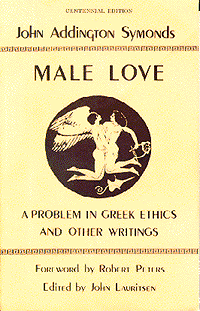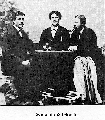
|
THE PIONEERS
|
This case includes the earliest writings in English about homosexuality, mostly male homosexuality. They date originally from circa 1785 to 1908. Six of the authors were British, one American. Four were heterosexual, three were gay. It is characteristic of an age of cant that most of these texts could not be published during the lifetimes of the men who wrote them, or were printed privately in editions of as few as ten copies, or were published for private subscribers only, or had to be published abroad. Such publishing histories document well the nearly successful effort to silence all public discussion of the sexual orientation and behavior "not to be named among Christians," as it was sometimes referred to. These pioneers bravely tried to break that silence.
Case Displays
- Jeremy Bentham, 1748-1832.
"Essay on Pederasty" in the Journal of Homosexuality.
New York: Haworth Press, Summer-Fall 1978. (Full
text of essay... html | pdf
)
This essay, from the Bentham manuscripts at University College, London, and written around 1785, was never published in Bentham's lifetime, nor in fact until almost 200 years later in the journal cited above. The subject is homosexual law reform. The legal penalty for what the law at that time called "buggery" (and Bentham, loosely, "pederasty") was death by hanging.
 Shelley
Shelley - Percy Bysshe Shelley, 1792-1822. "Discourse on the
Manners of the Antient Greeks Relative to the Subject of Love,"
in James A. Notopoulos, The Platonism of Shelley. New
York: Octagon Books, 1969.
Shelly intended the "Discourse" (written in 1818) to preface his translation of Plato's Symposium. In 1840, Mary Shelley published a fragment of the "Discourse" (in which there is no mention in the fragment of Greek love) along with a text of the translation bowdlerized (at the insistence of the publisher and Mrs. Shelley's friends) by substantial cuts and by the substitution throughout of "friend" and "friendship" for "lover" and "love." The complete text of the "Discourse" was not published until 1931--even then in an edition of one hundred copies for private circulation only.

 Symonds
Symonds - John Addington Symonds, 1840-1893. "A Problem in Greek
Ethics," in Male Love: A Problem in Greek Ethics and Other
Writings. New York: Pagan Press, 1983.
Although Symonds finished his essay "A Problem in Greek Ethics" in 1873, only in 1883 did he have it printed, privately and in ten copies "for the Author's use." It appeared publicly in English for the first time in 1897 as Appendix A of Havelock Ellis's Sexual Inversion, four years after Symonds's death. Symonds's friend and literary executor, Horatio Brown, bought up and destroyed all copies of this edition (except for a few already distributed) and persuaded Ellis to drop Symonds's name from the title page and remove other references to his collaboration in the project. (Many of Ellis's case histories were supplied by Symonds, including Symonds's own, case 17). The copy shown reproduces a pirated edition issued in 1901 in one hundred numbered copies by the clandestine press of Leonard Smithers.

 Burton
Burton - Sir Richard Francis Burton, 1821-1890. "Terminal Essay, Part IV/D, Social Conditions--Pederasty,"
in The Book of the Thousand Nights and a Night, Printed
by the Burton Club, for private subscribers only [1903?],
vol. 10. (Images are v. 10 title page and frontispiece.)
Burton's ten-volume translation of the Arabian Nights was privately printed in London in 1885-1886. This volume is from one of a number of limited editions, each of one thousand copies, reprinted from from the first edition by the Burton Club for subscribers. The essay on pederasty was omitted from the many subsequent commercial editions of Burton's translation.
Burton imagines a topography that he names the Sotadic Zone. It includes both shores of the Mediterranean, embraces Asia Minor, Afghanistan, Sind, the Punjab and Kashmir, Indo-China, China, Japan, the South Sea Islands, and much of the New World at the time of its discovery. He derived "Sotadic" from the name of the Greek poet Sotades, playfully offering "Satodism" as an esoteric substitute for "sexual inversion."
 Ellis
Ellis - Havelock Ellis, 1859-1939 .Sexual Inversion.
New York: Arno Press, 1975.
Sexual Inversion was published first in a German translation in 1896; the first English edition was London, 1897. In 1898, the book was labelled in a court of law as filthy, lewd, and obscene and confiscated by the police. Ellis was sympathetic to sexual difference and variety of sexual expression. He rejected current theories that "inverts"' were degenerate, perverted, or sick; challenged stereotypes of homosexual behavior and appearance; insisted on the ubiquity of homosexuality across time, cultures, and class; and emphasized the association of homosexuality with intellectual and artistic distinction.
 Carpenter
Carpenter - Edward Carpenter, 1844-1929. "The Intermediate Sex:
A Study of Some Transitional Types of Men and Women," in Selected
Writings, vol. 1: Sex. London: GMP Publishers Ltd.,
1984.
Beginning in 1894 with Homogenic Love, and its Place in a Free Society (privately printed by the Manchester Labour Press), Carpenter wrote a series of articles and pamphlets on homosexuality. These were collected into a book in 1908 under the title The Intermediate Sex. Carpenter 'came out' in his book My Days and Dreams (1916), and lived publicly with a working-class man named George Merrill (otherwise famous for having aroused E.M. Forster by pinching his bottom). He was a passionate democrat, a socialist, a feminist, and a disciple of Walt Whitman. With tender idealism, he foresaw a time when "the Uranian people [i.e., homosexuals] may be destined to form the advance guard of that great movement which will one day transform the common life by substituting the bond of personal affection and compassion for the monetary, legal and other external ties which now control and confine society."
 Mayne
Mayne - Xavier Mayne [Edward Irenaeus Prime-Stevenson], 1868-1942.
The Intersexes. A History of Similisexualism as a Problem
in Social Life. New York: Arno Press, 1975.
Intersexes was originally published at Naples, Italy, circa 1908, in a private edition of 125 copies. Its special interest for us is that Mayne was an American and himself a gay man of wide same-sex experience and wide acquaintance with other homosexuals, both European and American, many of whose sexual biographies he records. He concludes that homosexuality is natural, necessary, and legitimate. Xavier Mayne is also the author of what is probably the first overtly gay American novel: Imre. A Memorandum, 1906.
Note that the quotation on the title page reads: "Before we loathe the homosexual as anarchist against Nature, as renegade toward religion, as pariah in society, as monster in immorality, as criminal in law, let us feel sure that we have considered well whatever the complex mystery of Life presents as his defense .... "